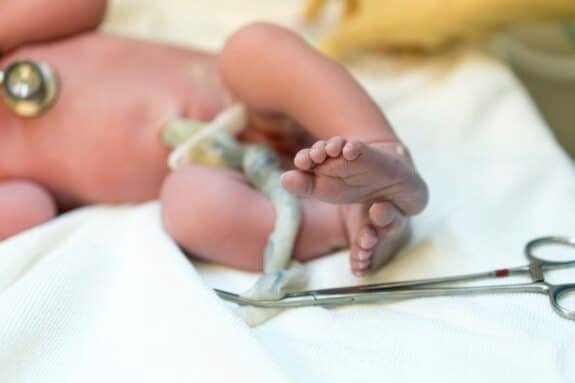For almost five decades, doctors have understood the dangers of drinking alcohol during pregnancy, particularly with the emergence of Fetal Alcohol Syndrome in the 1970s. This condition highlighted the dangers to children exposed to alcohol in the womb, resulting in many women abstaining from alcohol during pregnancy. However, the same caution has not been universally applied to marijuana. In fact, new research suggests a surprising trend: a significant number of women continue to use marijuana during pregnancy, potentially unaware of the risks it may pose to their unborn children.
A recent study conducted by National Medical Services (NMS) Labs, a provider of laboratory testing services in Horsham, PA, analyzed more than 90,000 umbilical cord samples collected over the past five years. The findings were surprising – almost 20% of these samples tested positive for cannabis, another term for marijuana. As marijuana is increasingly legalized and destigmatized in the United States, its use is increasing among all demographics, including pregnant women.
Dr Kari Midthun, a forensic toxicologist at NMS Labs, pointed out that the increasing availability of cannabis and changing social attitudes towards its use have contributed to this trend. Many people now see marijuana as a natural and safe choice, even during pregnancy. Some women may turn to marijuana to relieve common prenatal symptoms such as morning sickness, anxiety, and depression. But experts urge caution, stressing that our understanding of marijuana’s risks to pregnant women and their developing babies is also evolving.
Kelly C. Young-Wolff, PhD, MPH, a clinical psychologist and researcher at Kaiser Permanente, has been at the forefront of this research. Her studies of maternal health outcomes have revealed troubling links between marijuana use during pregnancy and various complications. Women who used marijuana in early pregnancy had a 17% increased risk of pregnancy-related high blood pressure, an 8% higher risk of pre-eclampsia and a 19% higher risk of placental abruption – a serious condition where the placenta detaches from the wall of the uterus before delivery. These findings underscore the growing body of evidence showing that marijuana use during pregnancy is far from safe.
Young-Wolff advises pregnant women to consult their health care providers about safer alternatives, especially if they are experiencing prenatal symptoms that might prompt them to consider marijuana. The risks extend beyond the mothers themselves. Infants exposed to marijuana in utero are also at risk. Dr. Torri Metz, a maternal-fetal medicine specialist at University of Utah Health, notes that the most common concern is low birth weight. He explains that numerous studies have consistently shown that babies born to mothers who used cannabis during pregnancy tend to be smaller.
An analysis published in the journal Obstetrics and Gynecology reviewed 16 studies involving nearly 60,000 women. The results were concerning: marijuana use during pregnancy was associated with an increased risk of premature births and reduced birth weight in newborns. While the long-term risks of prenatal marijuana exposure are harder to pin down, some research suggests possible problems with brain development. Dr. Kyle Walsh, associate professor of neurosurgery and pathology at Duke University, points to studies linking marijuana use during pregnancy to a higher risk of neurodevelopmental disorders, including ADHD and autism.
Perhaps even more troubling are the possible links between prenatal marijuana exposure and certain childhood cancers. Dr. Walsh’s research, published in the journal Cancer Epidemiology, Biomarkers and Preventionfound that prenatal marijuana use was associated with an increased risk of central nervous system tumors, including certain types of childhood brain tumors and eye tumors. These cancers appear to be associated with early brain development, suggesting that marijuana may pose the greatest risk during the early stages of pregnancy — often before a woman even realizes she’s pregnant.
Dr. Walsh emphasizes the importance of understanding that fetal neurodevelopment begins as early as 12 to 14 weeks of gestation. If a woman continues to use marijuana until she discovers she is pregnant, it may already be too late to prevent any of the potential harm. This makes it vital for women who are trying to conceive or who might become pregnant to carefully consider the use of marijuana.
As the medical community continues to study the effects of marijuana use during pregnancy, one question remains: does the mode of consumption matter? Whether marijuana is smoked, consumed as an edible, or used in another form, the body still processes the active compounds, which can cross the placenta and potentially affect the developing fetus. The impact of cannabidiol (CBD) products, which do not contain THC (the psychoactive component of cannabis), is still largely unknown, but research in this area is expected to expand in the coming years.
Dr. Metz emphasizes the need for more education on this issue, noting that many of her patients are unaware of the dangers marijuana poses to their unborn children. It encourages healthcare providers to discuss safer alternatives with their patients. For example, vitamin B6 supplements and over-the-counter medications such as doxylamine (Unisom) can help manage morning sickness, while anxiety and depression can often be managed with therapy and certain prescription medications.
More pregnancy news:
